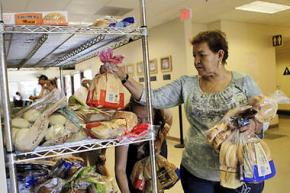Lies about the poor living large
reports on a new attack on those struggling to get by in America.
SOME OF the poorest people in the U.S. will no longer be eligible for food stamps in the next 18 months, and some states plan to kick them off the rolls even faster, according to a new report by the Center on Budget and Policy Priorities. According to the study:
Roughly 1 million of the nation's poorest people will be cut off SNAP (formerly known as the Food Stamp Program) over the course of 2016, due to the return in many areas of a three-month limit on SNAP benefits for unemployed adults aged 18-50 who aren't disabled or raising minor children. These individuals will lose their food assistance benefits after three months regardless of how hard they are looking for work.
Bill Clinton's 1996 welfare reform legislation--what we at Socialist Worker dubbed "welfare deform" at the time--required able-bodied adults without dependent children (ABAWDs, in government parlance) to work at least 20 hours a week to qualify for food assistance and other benefits.
Following the Great Recession of 2008, however, at least 35 states took advantage of federal waivers allowing them to extend eligibility for food assistance to unemployed ABAWDs beyond the three-month limit, because those states faced persistently high joblessness.

But with unemployment rates falling, some 23 states will cease to qualify for statewide waivers in fiscal year 2016, according to the Agriculture Department. Even more troubling, a number of governors looking to score political points at the expense of the poor won't even seek a federal waiver even if their state qualifies for it.
Indiana Gov. Mike Pence told Fox News, for example, that the thousands of people who will be kicked off food stamps by his decision not to request the federal waiver will be "ennobled" by his decision.
Maine Gov. Paul LePage also preemptively began kicking people off food stamps in his state--even though "three of Maine's 16 counties, home to about 100,000 of its 1.3 million residents, are designated 'labor surplus areas' by federal labor market monitors," according to ThinkProgress.org. "That means there is a serious imbalance between the number of people willing to work and the number of jobs available--an imbalance that stripping away food assistance will do nothing to correct."
THE MOST immediate outcome of these punitive measures aimed at the poor will be an increase in demand at already overstretched food pantries across the country. In Wisconsin, where Gov. Scott Walker is pursuing a similar course, the consequences will be dire. "We're going to run out of food," Sherrie Tussler, the executive director of the Hunger Task Force Milwaukee, told the New York Times. "It's going to cause wide-scale hunger here in Milwaukee, and we're in trouble."
The governors (mostly but not entirely Republicans) are pushing these measures as part of whipping up outrage at poor people among working-class and middle-class constituents. So despite the fact that food stamp fraud accounts for less than 2 percent of spending on food stamps, widespread media coverage of a few cases of such abuse has helped to promote the idea that abuse is rampant.
In the words of Washington Post blogger Emily Badger:
Poverty looks pretty great if you're not living in it. The government gives you free money to spend on steak and lobster, on tattoos and spa days, on--why not?--cruise vacations and psychic visits.
Enough serious-minded people seem to think this is what the poor actually buy with their meager aid that we've now seen a raft of bills and proposed state laws to nudge them away from so much excess. Missouri wants to curtail what the poor eat with their food stamps (evidence of the problem from one state legislator: "I have seen people purchasing filet mignons")...
Then there are the states that want to drug-test welfare recipients--the implication being that we worry the poor will convert their benefits directly into drugs.
But as Badger explains, this has nothing to do with the reality of people on food stamps and what they spend their money on. It's really about stigmatizing the poor and directing moral outrage at the truly disadvantaged while so many beneficiaries of government aid--such as the mortgage interest deduction in the federal tax code--escape anything approaching the demeaning treatment that the poor must endure.


